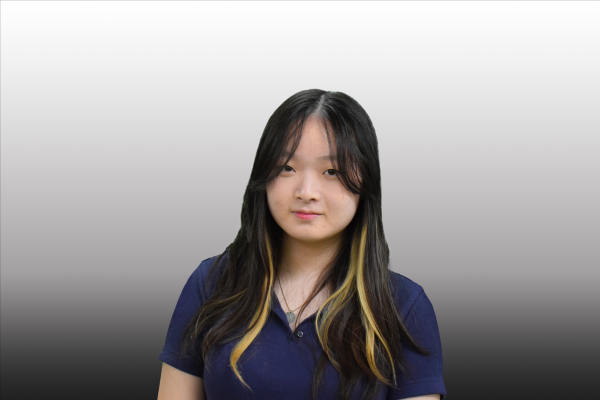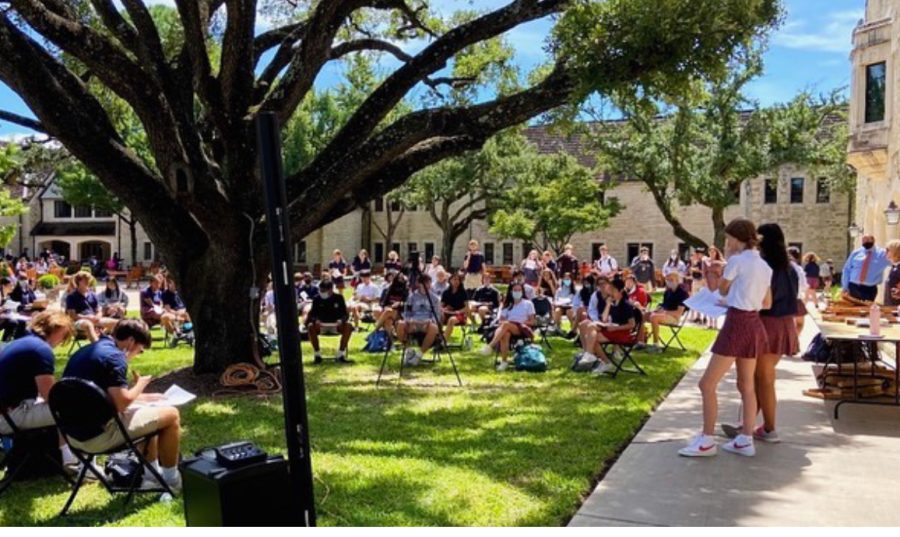Unity Council hosts forum on Russia and Ukraine
Students gathered in the plaza for the Unity Council forum about Russia and Ukraine.
For Katya Bigman and Margot Kades, the bloody conflict in Ukraine is a family affair.
“To my family and me, this is much more complicated than a territorial war waged by Russia against Ukraine,” Bigman said in her speech to around 150 attendees. “It is a civil war between deeply intertwined peoples as well as a clash between ideologies.”
Juniors Bigman and Kades spoke to a packed lawn at the Russia-Ukraine Unity Council forum on March 9, describing their Russo-Ukrainian connections and the impact that this situation has on their sense of identity. History teacher Eleanor Cannon followed with a short speech explaining the context of the war.
“This war doesn’t come as a huge surprise,” Kades said. “Putin’s been carrying out horrible crimes for many years, and this is just in character with his drive for domination.”
Since the war first broke out, Bigman and Kades have been wanting to discuss the implications of what the conflict means for them and the rest of the world. As part of a Spanish class assignment, Bigman wrote a poem addressed to Putin.
“For most of us, war is something that seems really far away, something we read about in our history textbooks,” said senior Eliot Aiman, co-chair of Unity Council. “Katya and Margo share an identity that seems to make this act of violence feel all the more personal. Showing up and wanting to listen to them is a great act of community and something I hoped the forum would enable.”
On Feb. 24, Russian President Vladimir Putin moved his forces into Ukraine. Over the course of the intervening fifteen days, two million civilians have fled Ukraine, Russian soldiers have bombed cities, hospitals and universities and a 40-mile-long line of Russian military vehicles has laid siege to Kyiv, the capital of Ukraine.
“This Russia and Ukraine conflict isn’t just a regional war,” junior Katya Bigman said. “The impact of this war has the potential to drastically change the current world order and change the precedent of not impeding on the territorial integrity of other sovereign nations.”
Tensions between Ukraine and Russia date all the way back to World War I, but they escalated in 2014 when Ukrainian protests removed Kremlin-backed President Viktor Yanukovych from power. With Lithuania, Latvia and Estonia joining NATO in 2004 and Ukraine’s new president Volodymyr Zelenskyy becoming increasingly in favor of Western influence in eastern Europe, Putin views Ukraine as a threat to his authority.
Bigman sees Russia and Ukraine as two historically and culturally similar countries who fought side by side in World War II, and said that Putin is afraid of being ousted from power if the Russian people see a free, democratic Ukraine doing better than Russia. Thus, he chose to act first.
Even though St. John’s is over 6,000 miles away from Russia and Ukraine, students have still found ways to help. People are holding Ukraine donation drives and fundraisers; some parents try to help out by paying for multiple nights in Ukrainian homes on AirBnb. Although the rooms won’t actually be rented out, the money still goes to the hosts and helps them feed their families, evacuate their homes and seek refuge in other countries.
“The AirBnB idea was a phenomenal show of unity,” senior Unity Council co-chair Elizabeth Schaefer said. “We are the next generation of changemakers, and when we’re old enough to make momentous decisions about how our world works, we have to remember how we felt when we saw these injustices occurring.”
Both Aiman and Schaefer stress the importance of staying educated and making sure not to get swept up by misinformation spread through the media. Kades also hopes students will take the war seriously and be mindful of what they say.
Whether they’re discussing Ukraine, Afghanistan or other world events, Aiman hopes that Unity Council will spread community, equity and care and serve as a place for students to converse freely about their beliefs.
“In my family, we have a saying: “Love is a verb.” I think democracy is a verb too,” Aiman said. “We have a duty to educate ourselves and be informed. When you’re informed, you can make decisions that impact yourself and others, and that can create positive change.”
Additional reporting by Smith Inglesby.

Elizabeth Hu ('25) joined The Review in 2021 as a freshman. Her guilty pleasure is plain bagels (no cream cheese, no spices, no nothing...), and she's...
Mia Hirshfeld ('24) joined The Review in 2021 as a sophomore. Her favorite movie is Knives Out and she enjoys Just Dance on her Wii that has been going...













